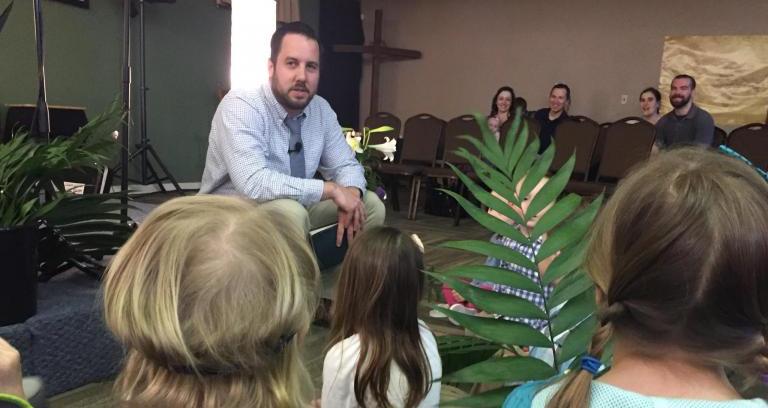In 2008, Houston-area mega-church pastor Kerry Shook and his wife and mission’s director Chris published the book One Month to Live: Thirty Days to a No-Regrets Life. It went on to become a New York Times bestseller, so perhaps you’ve read it. I confess that I have not.

But I do know that the major premise of the book is to imagine what you would do with your life if you knew that you only had one month to live and then to go out and live accordingly.
In the book, they offer four principles to a no-regrets life, which all sound reasonable enough: Live passionately, love completely, learn humbly, and leave boldly. (They get bonus points for coming up with four “L” words for their four principles.)
Regardless of the merits of this particular book, it’s based on an interesting thought experiment that we’ve probably all done at one time or another: How would I live my life if I knew that I only had 3 or 10 or 30 or 100 days to live?
If you google this question, you’ll find a number of interesting results, though many of the fall into similar categories.
A lot of people talk about taking that trip they never thought they could afford but always wanted to take. One person writes of taking a trip to Europe to see a best friend. Another writes of visiting India to meet her true love.
Others talk of reaching out to important people in their lives. One mentions writing letters to friends and family. Another writes of thanking those who have had an influence on his life. Still another writes of confessing her feelings to the one she loves.
Some people talk of getting their personal and financial affairs in order. One mentions writing his will. Another writes of donating her money to her church and other meaningful organizations. Still another mentions writing his own obituary.
Some talk about reflecting on life and its meaning. One talks of meditating on his life and whether he has any regrets. Another writes of contemplating all the things she has to be appreciative of.
Finally, a number of people talk of trying to enjoy their final days. One writes of throwing a big party. Another writes of eating his favorite meals and playing games with friends. Perhaps the most honest respondent writes: “I would eat all the junk food I can, no working out. I [would] just sit or lie around lazily eating all day, listen to favourite music, watch my all time favourite movies. Nothing left to worry about in the world. At the end of the given time, would like to fall asleep. Nothing better than dying in sleep.”
In this story from Luke, Jesus provides a different kind of answer altogether. Jesus has set his sights on journeying to Jerusalem, even knowing the fate that awaits him there. A few verses before this text, we read in verse 22: “Jesus went through the towns and villages, teaching as he went, always pressing on toward Jerusalem.”
Jesus is on a mission for God and he’s resolute to complete it. And it’s at this very time, Luke tells us, that some Pharisees warm him: “Get away from here if you want to live! Herod Antipas wants to kill you!” (v. 31).
There’s no reason to think that these Pharisees are anything but sincerely concerned for Jesus’s well being. They may not believe Jesus to be the Jewish messiah, but that doesn’t mean they want this rabbi killed by Galilee’s political leader.
However they received this information, they have good reason to believe it. Around the time John the Baptist had baptized Jesus, Herod had John thrown into prison for publicly criticizing him (Luke 3:19–20). Later Herod had John the Baptist killed by beheading. Then in chapter 9, verses 7 to 9, Luke writes: “When Herod Antipas, the ruler of Galilee, heard about everything Jesus was doing, he was puzzled. Some were saying that John the Baptist had been raised from the dead. Others thought Jesus was Elijah or one of the other prophets risen from the dead. ‘I beheaded John,’ Herod said, ‘so who is this man about whom I hear such stories?’ And he kept trying to see him.”
Now, as Jesus continues his ministry across the Galilean countryside on his way to Jerusalem, his renown continues to grow. If he’s not John the Baptist, Herod must reason, he’s every bit as dangerous and subversive as John was. So Herod decides to do to Jesus what he did to John.
But Jesus is already prepared for the death that awaits him, so he’s not the least bit worried by this threat on his life. He’s going to keep right on doing what he’s doing—regardless of what some two-bit ruler has to say about it.
“Go tell that fox,” Jesus says, referring to Herod, “that I will keep on casting out demons and healing people today and tomorrow; and the third day I will accomplish my purpose” (v. 32).
If it seems like Jesus is dissing King Herod, that’s because he is. In ancient Greek as in modern English, “fox” can indicate craftiness or cleverness. But for ancient Hebrew or Aramaic speakers like Jesus, it would mean something more like “insignificant, morally depraved poser.” It would be more like calling someone a weasel or jackass.
What gives Jesus the audacity to respond that way to a ruler who has the power to take his life—a power that he already displayed against John? Jesus continues: “Yes, today, tomorrow, and the next day I must proceed on my way. For it wouldn’t do for a prophet of God to be killed except in Jerusalem!” (v. 33).
It isn’t that Jesus doesn’t care about his life. It’s that he’s been sent on a mission by God, and he intends to see it to completion. He views his mission as in the long line of the Hebrew prophets, many of whom gave their lives for it as well—many in Jerusalem itself.
The book of Hebrews describes the prophets this way:
[They] were tortured, refusing to turn from God in order to be set free. They placed their hope in a better life after the resurrection. Some were jeered at, and their backs were cut open with whips. Others were chained in prisons. Some died by stoning, some were sawed in half, and others were killed with the sword. Some went about wearing skins of sheep and goats, destitute and oppressed and mistreated. They were too good for this world, wandering over deserts and mountains, hiding in caves and holes in the ground. (Heb. 11:35–38)
Because these prophets had hope in the resurrection, they were willing to give their lives for God’s cause. And because they were willing to give their lives, they had little regard for the power of kings to take them.
The prophet Nathan called out King David for stealing the wife of Uriah, saying, “You are that man!” (2 Sam. 12).
When the prophet Elijah heard that King Ahab was trying to have him killed, he went straight to confront him. When Ahab said, “So, is it really you, you troublemaker of Israel?” Elijah responded curtly. “I have made no trouble for Israel. You and your family are the troublemakers, for you have refused to obey the commands of the Lord and have worshiped the images of Baal instead” (1 Kings 18:17–18).
This is pretty much the standard level of regard that prophets show to rulers. One of the marks of a true prophet was that they didn’t just say what the rulers wanted them to but were willing to confront them. So now Jesus—as the culmination of the prophetic line—responds to Herod’s threats by calling him an insignificant little fox.
As we journey with Jesus to Jerusalem, we can follow Jesus’s lead here. It isn’t that we go out of our way to show disrespect to political leaders. The apostle Paul writes to believers in Rome: “Give to everyone what you owe them: Pay your taxes and government fees to those who collect them, and give respect and honor to those who are in authority” (13:7).
But there’s a difference between respect and fear.
The apostle Peter makes this clear in one of his letters when he writes: “Respect everyone, and love the family of believers. Fear God, and respect the king” (1 Pet. 2:17).
Peter writes that we should respect the king after just writing that we should respect everyone. In other words, we don’t give some kind of special deference to leaders just because they are leaders. We treat them with the same kind of respect that we should give every human being.
But too often Christians exaggerate the words of Paul and Peter to suggest that how we act as believers is somehow dictated by the views and decisions of our leaders. Last year we had an attorney general quote Paul to argue that Christians should blindly go along with the administration’s child separation policy.
Just last week the president one of the largest Christian universities in the country quoted Jesus’s words “Give to Caesar what belongs to Caesar” to likewise argue that Christians should just go along with the government’s policies. But the problem with using Jesus’s quote this way is that it begs the question: What belongs to Caesar? It seems to assume that we owe unflinching allegiance to Caesar when in context Jesus was arguing just the opposite.
In a debate over whether to pay taxes, Jesus held up a coin, showed the crowd that it had Caesar’s face on it, and said: “Well then, give to Caesar what belongs to Caesar, and give to God what belongs to God” (Luke 20:25). In other words, sure, go ahead and pay taxes, but don’t you dare fear or give your allegiance to anyone but God.
Just once, I’d love to hear a prominent Christian leader quote Luke 13 instead of Romans 13 when talking about the Christian’s duty to the state:
Go tell that fox: we’re going to keep doing what we do today and tomorrow and the next day whether he likes it or not.
Go tell that fox: we’re going to keep healing people today and tomorrow and the next day.
Go tell that fox: we’re going to keep loving our enemies today and tomorrow and the next day.
Go tell that fox: we’re going to keep caring for the poor, the widow, the orphan, and the stranger today and tomorrow and the next day.
Go tell that fox: we’re going to keep proclaiming release for the captives and freedom for the oppressed today and tomorrow and the next day.
Go tell that fox: we’re going to keep fighting racism and white supremacy today and tomorrow and the next day.
If he’s got a problem with that, too bad because we’ve already offered our bodies as living sacrifices holy and pleasing to God—as our true and proper worship. We no longer conform to the pattern of this world, but have been transformed by the renewing of your mind so that we’ll be able to test and approve what God’s will is—the good, pleasing, and perfect (Rom. 12:1–2).
If he’s got a problem with that, too bad because we’ve already been crucified with Christ and no longer live, but Christ lives in us. The life we now live in the body, we live by faith in the Son of God, who loved us and gave himself for us (Gal. 2:20).
So, yes, he can save his threats, because we’re already dead to this world.
We might think that Jesus relishes this role—talking prophetic smack to his leaders. But that would misunderstand what it means to be a prophet. Yes, prophets confront leaders who act unjustly, but prophetic confrontation is always combined with prophetic lament.
The prophet Jeremiah confronted King Zedekiah for trying to form alliances with other nations instead of accepting God’s judgment from the Babylonians. But Jeremiah is also thought to have written the book of Lamentations, which laments the destruction of Jerusalem that Jeremiah prophesied.
Likewise, Jesus has no problem brushing off the threats of kings, but that doesn’t mean that he doesn’t care for the people. Even after declaring that he’ll be killed by the leaders in Jerusalem, he cries out: “O Jerusalem, Jerusalem, the city that kills the prophets and stones God’s messengers! How often I have wanted to gather your children together as a hen protects her chicks beneath her wings, but you wouldn’t let me. And now, look, your house is abandoned. And you will never see me again until you say, ‘Blessings on the one who comes in the name of the Lord!’” (vv. 34–35)
Jesus doesn’t call out leaders simply to be a rebel. He does so because he sees himself as a mother hen trying to protect her chicks from foxes. But the chicks themselves keep running off to the foxes!
So Jesus chastises the fox, but he weeps over the chicks. He laments that they have abandoned their true home to run after those who are devouring them. And then he renews his resolve to sacrifice his life as the hen for the sake of his chicks.
He knows that only by giving his life will he turn their hearts back again so that they will finally say: “Blessings on the one who comes in the name of the Lord!”
















